
Essentials of B2B CRM [Benefits, Strategies & Best Practices]
 Updated on
Updated on
By Ringy
Table of Contents
Table of Contents
The B2B business sector is proliferating beyond anyone's expectations.
If your B2B company is expanding to the degree that it's becoming incommodious, a CRM can help make things more manageable.
This guide shows you everything you need to know, including what B2B CRM software is, the benefits of implementing it, various strategies, the available solutions of the market, best practices, and more.
What Is a CRM in B2B?
The plan of both B2C marketing and B2B sales funnels is to lead the prospects through the pipeline utilizing content and messages that begin generating leads and brand awareness. After deals have been closed, sales representatives can follow up with comprehensive client care to increase brand advocacy and repeat business.
B2B business environments have many nuances that make them much more multifaceted and complicated than a single prospect. Organizations have numerous requirements and considerations at each sales funnel stage, making it arduous to determine what's needed.
Enter B2B CRM systems!
By extracting and recording the data mentioned above, a B2B CRM platform allows sales and marketing teams to monitor customer interactions thoroughly to understand what influences them.
Specific tasks can also be automated to free up employees' time, allowing them to concentrate on moving the client to the next stage of the funnel.
Standout Features of a B2B CRM
Here are some of the key features of a B2B CRM system:
Granular Account Management in B2B CRM
Effective B2B customer relationship management starts with granular account management, allowing businesses to meticulously organize and track interactions with their clients. A robust B2B CRM system should provide a detailed view of each account, including contact information, communication history, and transaction records. For instance, the CRM might offer a dedicated dashboard for each client, offering a comprehensive snapshot of their journey with the company.
This feature ensures that sales teams can tailor their approach based on the specific needs and preferences of each B2B client, ultimately fostering stronger and more personalized relationships.
Sales Funnel Creation for B2B Success
A B2B CRM's capability to create and manage sales funnels is crucial for optimizing the sales process. This feature assists in visualizing the various stages of a deal, from lead generation to conversion. An exemplary B2B CRM allows users to customize sales funnel stages to align with their unique business processes.
For example, it might enable the categorization of leads based on the level of engagement, helping sales teams prioritize and focus on high-value opportunities. This ensures a systematic approach to B2B sales, enhancing efficiency and increasing the likelihood of successful deals.
Reporting and Analytics Empowering B2B Decision-Making
In the B2B landscape, data-driven decision-making is paramount. A standout B2B CRM should offer robust reporting and analytics tools to provide insights into sales performance, customer behavior, and overall business trends.
For instance, it might generate detailed reports on conversion rates, customer acquisition costs, and sales team productivity. Integrating these analytics into the CRM system enables businesses to refine their strategies, identify areas for improvement, and make informed decisions that positively impact their bottom line.
Lead Management: Nurturing B2B Relationships
Lead management is a core feature of B2B CRM, ensuring that potential clients are effectively nurtured throughout the sales cycle. The CRM should facilitate tracking leads from initial contact to conversion and beyond.
An automated system can be used to send follow-up emails or reminders to sales representatives to engage with leads at critical points in the sales funnel. This functionality ensures that no opportunity is overlooked, and leads are consistently nurtured, ultimately increasing the chances of converting them into satisfied B2B customers.
Seamless Integrations for Enhanced B2B Workflow
A top-notch B2B CRM system seamlessly integrates with other essential tools and platforms in the business environment. Whether it's email, marketing automation, or project management tools, integrations enhance the overall workflow and efficiency of the B2B sales process.
These integrations save time, reduce manual data entry, and ensure a cohesive and connected ecosystem for B2B sales teams.
Benefits of CRM for B2B

B2B businesses thrive on discovering prospects while tapping into multiple niches, determining their lead's potential interest in their services or products, and directing them to the end of the sales funnel to become a customer.
Customer relationship management during this process is crucial to impressing and converting the prospect. Once they are a marketing qualified lead (MQL), additional material that is more sales orientated is sent their way.
In many ways, a CRM helps gather the insights required to tailor content to a prospect's needs and desires. Here are some of the primary benefits of CRM for B2B businesses that company owners enjoy.
Nurturing Leads
CRM systems can map the customer journey and record vital information, such as client preferences, previous interactions with other employees, and purchase history. This data allows sales teams to guide the prospect down the sales funnel until they are ready to make a buying decision.
Aligning Marketing and Sales Team Efforts
B2B organizations where marketing and sales teams collaborate generally see higher conversion rates. When these different parties work in unison with a B2B CRM system, it accelerates sales conversion.
Potential customers who enter the purchasing decision phase are edged along with clever content and triggers to get them to take action. Utilizing a B2B CRM platform, sales and marketing teams have updated prospect information at their fingertips.
Improves Customer Personalization
Communicating with your customer where they hang out most is fast becoming the new way businesses find leads. B2B CRM systems can easily integrate with numerous third-party platforms and automated tools.
Marketers can segment their prospects by connecting B2B CRM software with third-party applications based on their firmographic or demographic data. This allows employees to customize the customer experience by providing an accurate solution to their issues.
Task Automation
A capable B2B CRM system can handle mundane tasks such as sending reports or filling out a form. Streamlining these rudimentary activities frees up time for sales teams to focus on what matters most: making sales.
The table below shows you some advantages and disadvantages to think about before incorporating task automation into your organization’s content marketing efforts.
|
Advantages of Tasks Automation |
Disadvantages of Task Automation |
|
Shares relevant content with your target audience |
Automated replies, mentions, or comments can be flagged as spam |
|
Automation can circulate evergreen content that will consistently drive traffic to your site |
If the same content is posted multiple times, it’s considered spam and may be bad for SEO scores |
|
Task automation can schedule the correct content to the right channel at the right time |
Some tools don’t offer content personalization options before posting to different channels |
|
Some automation tools allow you to customize the post before establishing its publishing schedule |
Automated content curation may skip the reviewing process |
B2B CRM for Analytical and Sales Reporting
Besides its built-in features, the best characteristic of a B2B CRM platform is its ability to integrate with various plugins and task automation tools. Marketers can receive personalized reports about existing and potential customers, which can be used to tailor the client’s experience.
Analyzing client data can help business owners tap into new niches to boost sales and marketing ventures. Performance reports can be created to monitor the progress of the outreach efforts and customer retention rates.
CRM B2B Strategies

Managing an organization's relationship with its clients is a challenging task. That's why companies utilize strategies when incorporating a B2B CRM platform into their enterprise.
Strong company relationships assist in business growth, drive more sales, and help close deals. A customer relationship management system enables the implementation of a B2B sales strategy.
Here are six B2B CRM strategies that improve marketing and sales team alignment, facilitate business expansion, and fuel sales.
Get Teams on the Same Page
B2B CRM software education is vital to the success of its implementation. It's challenging to increase the software's usage if the teams have different understandings of how the basics work.
Acknowledging what critical aspects the B2B CRM software manages is foundational to accomplishing your business goals. Share this information with your team so everyone speaks the same language and knows what's expected of them.
Everyone should have shared knowledge about the B2B CRM platform, so things become rudimentary later on.
Learn About Your Customers' Requirements
Organizations should always know their client's requirements and what products or services they favor. The best way to find this information is to extradite it from the B2B CRM platform's stores.
Sales teams utilize B2B CRM software to record details concerning their communications with potential clients. While talking with prospects, sales representatives can ask why they chose their organizations and what they're looking for.
With all customer information in a centralized database, figuring out what the client requires becomes straightforward.
Concentrate on Businesses, Not Individuals
The B2B sector concentrates on working with other organizations, not single contacts. With more corporate customers involved, businesses in the B2B space have a greater chance of flourishing.
Focus on creating a well-rounded customer experience for these enterprises while making after-sales service the cornerstone of your organization. For example, once a company has purchased a service or product, your team could run in-office training on how to utilize the solution better and invite senior employees of the customer's company to join.
The more you can show the importance of your solution, the more chances the organization you work with will become long-term customers.
Create Relevant and Engaging Content
Content is king, and this statement is entirely accurate in the B2B sector.
Clients usually rely on informational articles to make informed decisions during the buying process. Moreover, well-written educational content based on your product is the best way to attract more visitors to your solution.
Think of creating a content library based on your target market's most common queries. Content marketing is essential because it assists in generating leads, improving conversions, developing relationships, and building trust by answering your audience's questions.
Monitor Customer Success Levels

B2B CRM software allows you to monitor whether prospects see the value of your solutions. Sales teams can utilize these platforms to track and manage the customer's journey through the sales funnel.
After the client has completed the onboarding process, it's good to check in on them to determine if they have had any issues. Then, find out the ongoing engagement rates of that specific customer.
Lastly, find out how often the client is using the product. The more people utilize a solution, the more valuable it becomes to them.
5 Best CRM B2B Sales Software Options
1. Ringy
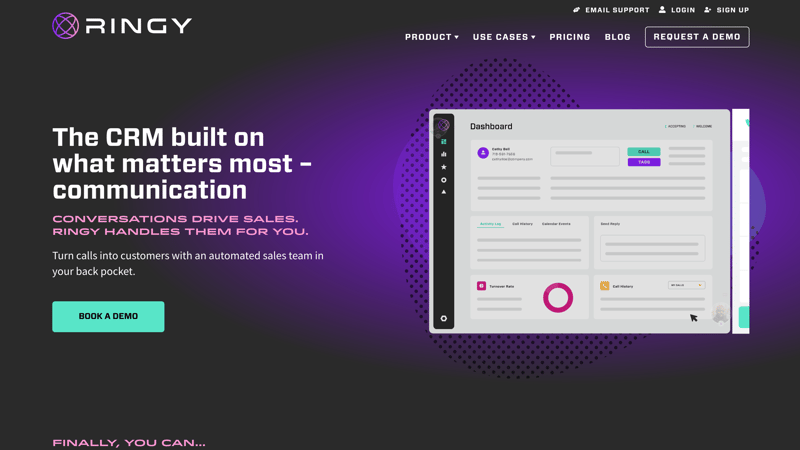
This B2B CRM platform is an all-in-one solution that helps businesses track, manage, or monitor customer relationships. Ringy was developed with automation and assists organization proprietors in streamlining their business processes.
The B2B CRM solution's dashboard is intuitive and user-friendly, allowing even new people in customer relationship management to get up to speed with the software.
Here are some of the essential features you’ll enjoy as a business from our CRM.
|
Features |
Description |
|
Contact Management |
Manage all of your customer contacts in one place, including contact information, purchase history, and interactions with your sales team. |
|
Lead Management |
Track and nurture leads through the sales funnel, from initial contact to closing the deal. |
|
Sales Pipeline Management |
Visualize your sales pipeline and identify bottlenecks. |
|
Reporting and Analytics |
Generate reports and insights to improve your sales performance. |
|
Integrations |
Ringy CRM integrates with a variety of other business software applications, such as email marketing platforms, accounting software, and customer support systems. |
Request and demo and find out what this state-of-the-art B2B CRM system offers.
2. Zoho CRM
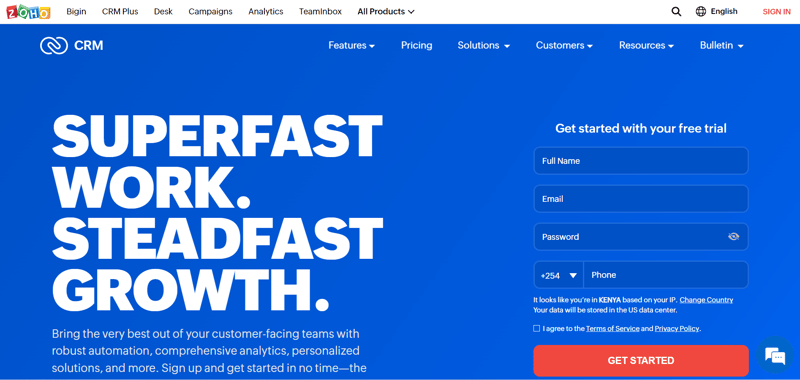
B2B CRM software from Zoho helps companies with industry-oriented and general-purpose applications. It utilizes a customizable CRM user interface to manage data from numerous client channels, including:
- Social media
- Live chat
- Phone calls
Zoho CRM also allows you to automate repetitive tasks, update customer information, or nurture leads. The software includes AI tools and real-time analytical reporting to identify prospects that'll most likely purchase from your company.
With distinctive features like mass mail solutions and coding-free lead generation web forms, Zoho CRM is suitable for organizations of all sizes.
3. SAP Sales Cloud
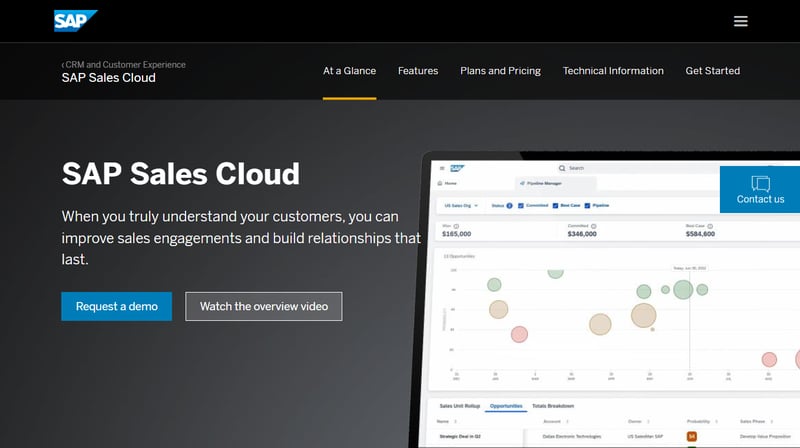
This cloud-based B2B CRM solution from SAP delivers a unified overview of client interactions and customers for a seamless online and offline experience. SAP Sales Cloud integrates with common third-party platforms such as Gmail and Microsoft Outlook to streamline appointment setting or lead generation tasks.
Sales teams can prioritize and score sales opportunities and support sales forecasting with the AI tools SAP offers. The platform focuses on small groups that require a full-featured CRM platform at an enterprise level. If you need a cheaper option with fewer features, looking at another solution may be a good idea.
4. Freshsales
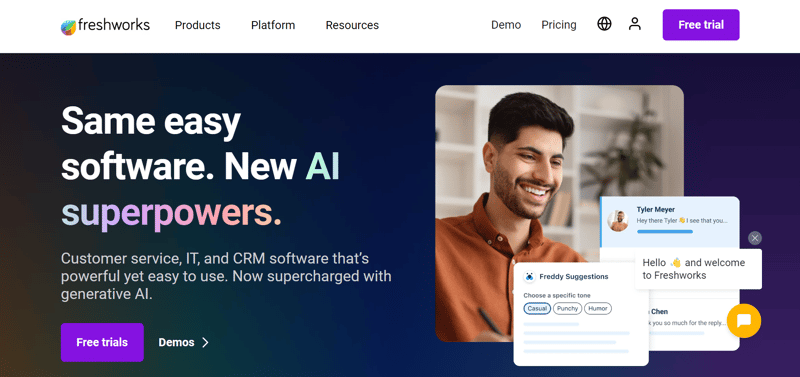
Freshsales is a cloud-based CRM software that is designed to be easy to use and affordable for businesses of all sizes. It offers a variety of features that are specifically designed for B2B sales, such as:
- Lead scoring and routing: Freshsales helps you qualify and route leads to the right sales reps based on their interests and demographics.
- Sales pipeline management: The software provides a visual overview of your sales pipeline, so you can easily track the progress of your deals.
- Opportunity management: You can manage and track sales opportunities, making it possible to close more deals faster.
- Customer relationship management: Freshsales helps you build and maintain strong customer relationships by tracking all of your customer interactions.
- Reporting and analytics: Freshsales provides a variety of reports and analytics that can help you track your sales performance and identify areas for improvement.
5. ActiveCampaign
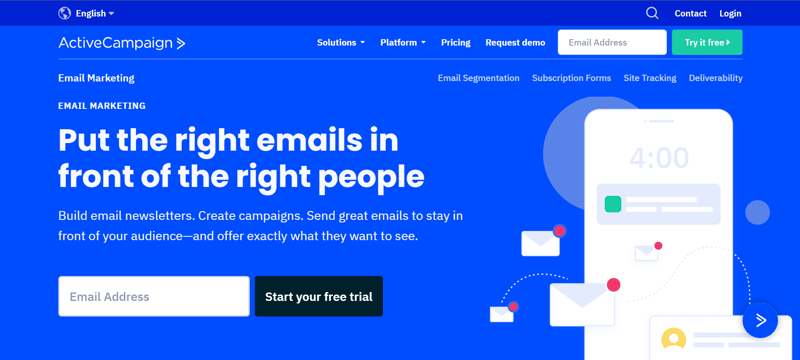
ActiveCampaign is a CRM and marketing automation platform that helps businesses of all sizes grow their sales. It offers various features specifically designed for B2B sales, such as:
- Contact segmentation: ActiveCampaign allows you to segment your contacts based on their interests, demographics, and behavior. This allows you to send targeted marketing messages to the right people.
- Email marketing automation: The system automates your email marketing campaigns so you can save time and send more personalized messages to your prospects.
- Sales automation: ActiveCampaign automates your sales tasks, such as lead scoring, routing, and follow-up emails. This allows your sales team to focus on closing deals.
- Integrated CRM: The software has a built-in CRM allowing you to track your sales pipeline, manage opportunities, and build customer relationships.
Best Practices for B2B CRM Software

Providing top-notch customer service and experiences is why many companies invest in B2B CRM software. An intelligent CRM system implementation process and correct utilization are essential in the B2B sector, where organizations tend to know their customers more personally.
B2B businesses follow these CRM best practices to get the desired results.
Have a Clear Vision
It's easy to think B2B CRM software can fix all your business process issues. However, it's only part of the solution. The technology must be utilized correctly to fit the rest of the organization's goals.
Before selecting a B2B CRM, consider what you want to achieve and the challenges you may encounter. Then, figure out how a B2B fills those gaps.
Select a B2B CRM That Matches Your Companies Needs
Choosing a B2B CRM software that ticks all your business challenge boxes is crucial to its successful implementation. Multiple B2B CRMs exist, but not all are created similarly. Extensive research is required to determine these systems' various capabilities and weaknesses.
Below are three questions to ask before investing in a B2B CRM platform:
- Do you require a B2B CRM system that can be easily personalized and highly flexible, or will an out-of-the-box solution be better?
- Is there additional support required from the vendor?
- Do you want cloud-based or on-premise software?
Train Your Team
The correct B2B CRM system offers multiple advantages, but if utilized incorrectly, the software becomes a costly data storage platform for client information. That's why training your employees to use the new B2B CRM software is crucial, even if they have previously operated comparable applications.
Consider testing teams to ensure they have cognizance of everything taught. Retraining is also an excellent idea to improve team education, make sure everyone is knowledgeable on the B2B CRM system, and ensure your staff follows best practices.
Utilize Automation
B2B CRM platforms contain sales force automation tools that help streamline company processes. These features include but are not limited to the following:
- Automated data entry
- Lead qualification notifications
- AI-driven insights
- Custom metrics utilized to assign leads automatically
- Sales relationship notifications
It's plain to see how B2B CRM software is designed to help companies handle manual work like data collection and entry. This improves your team's productivity and minimizes the chances of human error.
Analyze Your Data
Whether it's customer or employee data, a B2B CRM system captures and efficiently arranges massive amounts of information. To amplify the advantages of this feature, business owners should analyze these technical reports.
The most prominent B2B CRM platforms have built-in innovative analytical capabilities that autonomously present data to you. Here are some intuitive features that a dynamic CRM solution offers:
- Deal flow visualization
- Predictive forecasting
- Relationship health notification
- Deeper insights
- Lead scoring capabilities
With these features, company proprietors can concentrate on analyzing the information and develop plans for the next stage in the sales process.
Conclusion

B2B business planning primarily aims to build a loyal customer base. One part of accomplishing this goal is having the correct B2B CRM software and strategy. As each client is unique, companies must find the proper approach when contacting them.
B2B CRM platforms help organizations understand their clients and serve them better. Marketing and sales campaigns are no longer based on assumptions or guesses but on clearly mapped-out stages.
A platform like Ringy is ideal for your B2B business and can ultimately improve customer relationships while gaining their trust. Request a demo today with our B2B CRM automation software that puts a business's most crucial asset first: the customer!

Skyrocket your sales with the CRM that does it all.
Calling? Check. SMS? Check. Automation and AI? Check. Effortlessly keep in touch with your customers and boost your revenue without limits.

Take your sales to new heights with Ringy.
Sales in a slump? Ringy gives you the tools and flexibility you need to capture leads, engage with them, and turn them into customers.
Subscribe to Our Blog
Enter your email to get the latest updates sent straight to your inbox!
Categories
Related Articles




































































































